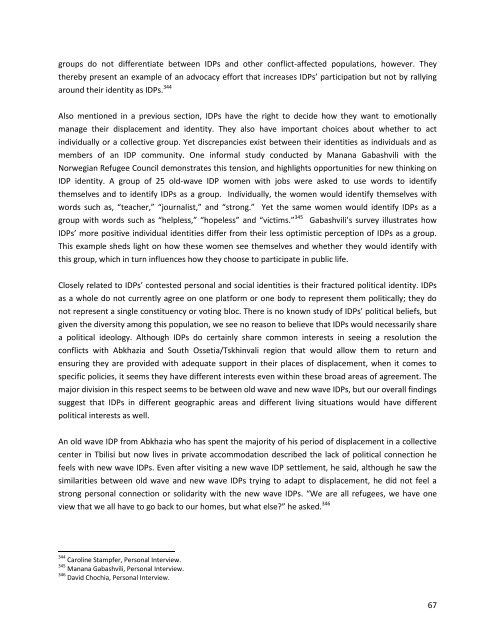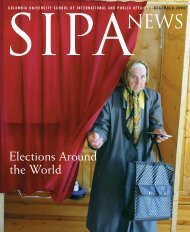Promoting IDPs' and Women's Voices in Post-Conflict Georgia
Promoting IDPs' and Women's Voices in Post-Conflict Georgia
Promoting IDPs' and Women's Voices in Post-Conflict Georgia
- No tags were found...
You also want an ePaper? Increase the reach of your titles
YUMPU automatically turns print PDFs into web optimized ePapers that Google loves.
groups do not differentiate between IDPs <strong>and</strong> other conflict-affected populations, however. Theythereby present an example of an advocacy effort that <strong>in</strong>creases IDPs’ participation but not by rally<strong>in</strong>garound their identity as IDPs. 344Also mentioned <strong>in</strong> a previous section, IDPs have the right to decide how they want to emotionallymanage their displacement <strong>and</strong> identity. They also have important choices about whether to act<strong>in</strong>dividually or a collective group. Yet discrepancies exist between their identities as <strong>in</strong>dividuals <strong>and</strong> asmembers of an IDP community. One <strong>in</strong>formal study conducted by Manana Gabashvili with theNorwegian Refugee Council demonstrates this tension, <strong>and</strong> highlights opportunities for new th<strong>in</strong>k<strong>in</strong>g onIDP identity. A group of 25 old-wave IDP women with jobs were asked to use words to identifythemselves <strong>and</strong> to identify IDPs as a group. Individually, the women would identify themselves withwords such as, “teacher,” “journalist,” <strong>and</strong> “strong.” Yet the same women would identify IDPs as agroup with words such as “helpless,” “hopeless” <strong>and</strong> “victims.” 345 Gabashvili’s survey illustrates howIDPs’ more positive <strong>in</strong>dividual identities differ from their less optimistic perception of IDPs as a group.This example sheds light on how these women see themselves <strong>and</strong> whether they would identify withthis group, which <strong>in</strong> turn <strong>in</strong>fluences how they choose to participate <strong>in</strong> public life.Closely related to IDPs’ contested personal <strong>and</strong> social identities is their fractured political identity. IDPsas a whole do not currently agree on one platform or one body to represent them politically; they donot represent a s<strong>in</strong>gle constituency or vot<strong>in</strong>g bloc. There is no known study of IDPs’ political beliefs, butgiven the diversity among this population, we see no reason to believe that IDPs would necessarily sharea political ideology. Although IDPs do certa<strong>in</strong>ly share common <strong>in</strong>terests <strong>in</strong> see<strong>in</strong>g a resolution theconflicts with Abkhazia <strong>and</strong> South Ossetia/Tskh<strong>in</strong>vali region that would allow them to return <strong>and</strong>ensur<strong>in</strong>g they are provided with adequate support <strong>in</strong> their places of displacement, when it comes tospecific policies, it seems they have different <strong>in</strong>terests even with<strong>in</strong> these broad areas of agreement. Themajor division <strong>in</strong> this respect seems to be between old wave <strong>and</strong> new wave IDPs, but our overall f<strong>in</strong>d<strong>in</strong>gssuggest that IDPs <strong>in</strong> different geographic areas <strong>and</strong> different liv<strong>in</strong>g situations would have differentpolitical <strong>in</strong>terests as well.An old wave IDP from Abkhazia who has spent the majority of his period of displacement <strong>in</strong> a collectivecenter <strong>in</strong> Tbilisi but now lives <strong>in</strong> private accommodation described the lack of political connection hefeels with new wave IDPs. Even after visit<strong>in</strong>g a new wave IDP settlement, he said, although he saw thesimilarities between old wave <strong>and</strong> new wave IDPs try<strong>in</strong>g to adapt to displacement, he did not feel astrong personal connection or solidarity with the new wave IDPs. “We are all refugees, we have oneview that we all have to go back to our homes, but what else?” he asked. 346344 Carol<strong>in</strong>e Stampfer, Personal Interview.345 Manana Gabashvili, Personal Interview.346 David Chochia, Personal Interview.67

















